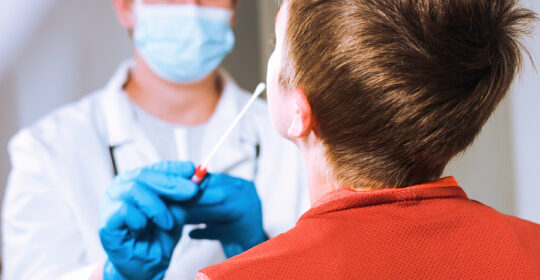
So, which COVID-19 test do I need?
By: Joseph Mechak, MD
COVID-19 cases are ticking-up nationwide. One major difference between March 2020 and October 2020 is the availability of COVID-19 testing. Overall, this is a major positive in the fight against COVID-19. It allows for earlier detection, better isolation/quarantine measures, and contact tracing. Tests are now fairly widely available at places like doctors offices (including Potomac Pediatrics), the health department, urgent cares, and even places like Costco or Amazon.com. With the variety of places offering tests and the variety of different test types, it is important to know what test you are getting and if it is the right test for your situation.
There are three general tests for COVID-19. The Rapid Antigen test, the PCR test, and the antibody test. We offer all three of these at Potomac Pediatrics, so let’s talk about what they are and what they do:
COVID-19 Rapid Antibody testing
- The Basics: This test looks for current COVID-19 infection. Antigen tests are typically collected by a nasal or nasopharyngeal swab or a throat swab. The major benefit of this test is that they are inexpensive and results are rapid, typically available in minutes. In general, these tests are very accurate if the test is positive, but there is a high false negative rate. This means that a negative test does not definitively rule out COVID-19 infection – which is problematic. This false negative rate is particularly high if the test is done too soon after exposure or early in the course of illness.
- The Science: An ‘antigen’ refers to a piece of viral material. An antigen test, put simply, looks for the presence of this viral material in a collected sample. Most COVID-19 antigen tests look for the spike protein on the outside of the viral surface.
- When this test is helpful: These tests are best used for surveillance testing due to their rapid and inexpensive nature. The high false negative rate limits their use if there is a high suspicion for COVID-19. This would include situations where there is a known close exposure or with COVID-19 symptoms. They may be used together with a PCR test if rapid results are needed/desired, but the PCR should be considered the more definitive test.
COVID-19 PCR testing
- The Basics: This test looks for current COVID-19 infection. Samples can be collected by nasal or nasopharyngeal swab, saliva collection, or throat swabs. These tests are highly accurate for both positive and negative results. Results are usually available in 2-3 days (but highly dependent on lab site volume). This test is the best test if you have a known exposure or symptoms concerning active infection.
- The Science: The PCR test looks for viral RNA. PCR stands for polymerase chain reaction which is a powerful molecular tool that amplifies viral RNA. This amplification allows the test to detect the virus even if there is a small initial viral load. This amplification allows it to be more accurate than an antigen test.
- When this test is helpful: This is the gold standard for COVID-19 testing. This is the best test after a known exposure or with symptoms that are consistent with COVID-19. It can be used in tandem with the antigen testing if rapid results are desired, but the PCR test should be used for decision making about isolation/quarantine.
COVID-19 Antibody testing
- The Basics: This test looks for previous COVID-19 infection. Samples are collected through a blood draw. This test does not look for the presence of the virus. Instead, it looks for evidence of antibodies, the body’s memory response, to the virus. This test can only tell you if you have been previously exposed, it cannot tell you when the infection occurred or if/how long you are immune to the virus. It can take 2-3 weeks to develop antibodies, so tests performed before then may be inaccurate.
- The Science: This test looks for the presence of your antibodies against COVID-19. When your body is exposed to a virus, it mounts an immune response. The end results of this immune response is the creation of specific antibodies to that virus. These antibodies allow the body to respond more quickly if it is exposed to that virus again. So, if your blood has antibodies to COVID-19 it tells you that your immune system had been previously exposed to COVID-19 (…or a COVID-19 vaccine – fingers crossed).
- When this test is helpful: This test is helpful for public health surveillance. It can help detect asymptomatic carrier rates and provide a more complete picture of COVID-19 rates in the community. On an individual level, there is no clarity on what the presence of antibodies means for your health. It may provide some temporary protection against COVID-19, but you should NOT think of yourself as immune or unable to contract the virus again if you have antibodies.
So, how do you decide what test is best?
- Let us help you. This stuff is complicated and it is not straight-forward, even for us. For this reason, at Potomac Pediatrics, if you are getting a COVID-19 test we either arrange a telemedicine visit or sick visit so that we can discuss risks, benefits, limitations or each test, help you decide which test is best for you, and discuss what to do with the results.
- Keep in mind that not all tests are created equal. Tests (of any type) from different companies have different levels of reliability. So, be wary of some of the commercially available tests. We have vetted and carefully chosen the tests that we use in the office.
- Remember, getting tested too soon after an exposure increases the likelihood of a false negative! The timing of testing can be just as important as the test type! This is also something we will help you decide during your televisit.
- If you need a negative COVID-19 test for school or sports – check what type of tests will be accepted.
If you have further questions or want to schedule an appointment to discuss testing please contact the office and we will get you on the schedule!











Leave a reply